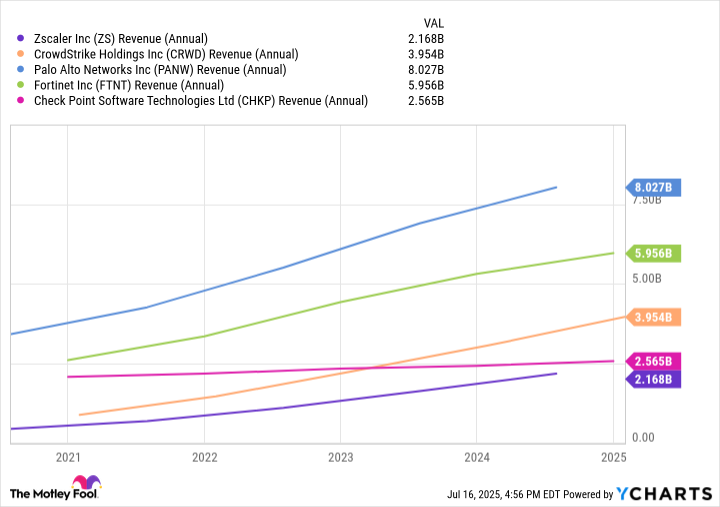Cybersecurity stocks are some of the most promising investments you can make right now. Statista estimates that spending on cybersecurity will reach $196.51 billion this year, and increase to $262.29 billion by 2030. That's a compound annual growth rate (CAGR) of nearly 6%.
Companies are investing in cybersecurity in response to the growing threat of state-sponsored cyberattacks. In addition, businesses and individuals are increasingly using technology to store sensitive information such as financial records, health information, and personally identifying information.
While there are some interesting pure-play cybersecurity stocks, I think it's also beneficial to look beyond the obvious when choosing how to play the sector. For my money, I think a diverse field of cybersecurity stocks includes International Business Machines (IBM +2.63%), Microsoft (MSFT +0.70%), and CrowdStrike (CRWD 0.17%).
Read on to see how these companies are becoming leaders in the cybersecurity space, and would be ideal long-term investments.

Image source: Getty Images.
1. International Business Machines
IBM, as it is commonly called, is one of the best-known and most important computer companies in the world. It has an amazing past that traces its history to the beginning of the 20th century and its first data processing machines, a punched card tabulator. IBM would go on to popularize the personal computer in the 1980s and was one of the early adopters of artificial intelligence with its Deep Blue supercomputer, which famously defeated chess champion Garry Kasparov in 1997.

NYSE: IBM
Key Data Points
However, IBM today is very much focused on cybersecurity, cloud computing, and consulting. It has products to help businesses prepare for cyber threats, AI-powered cybersecurity solutions, and security consulting and management. It also has a dominant 81% position in the mainframe market favored by Fortune 500 corporations, in part because of their protection against cyberattacks -- even if part of the mainframe goes down, the rest of the computer can continue to keep the business operational.
2. Microsoft
Microsoft isn't a pure-play cybersecurity company either, but that's why I like it. Buying Microsoft stock gets you exposure to the cybersecurity space as well as the amazing array of products that Microsoft has, including Its Azure cloud services, the Microsoft 365 suite of products, Windows, Xbox gaming, and more.
But this is a big cybersecurity play. Microsoft reported $20 billion in cybersecurity revenue in 2024, which is nearly as much as five of the top pure-play companies combined.
ZS Revenue (Annual) data by YCharts
Microsoft's AI-powered security products operate on a zero-trust framework, which means everything is treated as a potential threat and investigated accordingly. Essentially, every time a user makes a request in the platform, Microsoft's security system will reverify the user to make sure it's not a malicious request.
The products are integrated into Microsoft's Azure and Microsoft 365 suite of office products, which completely embeds Microsoft into a company's cybersecurity plan. That's a moat that other companies can only dream of having.
3. CrowdStrike
This is the only pure-play cybersecurity stock on the list. It's best known for its endpoint platform, Falcon, which uses artificial intelligence to stop threats on laptops, servers, and mobile devices.
The brilliance of CrowdStrike's business model is in its module system. The company provides 30 modules on its Falcon platform to give clients a customized solution for their cybersecurity needs. And once a company is hooked on a module, it's pretty easy to expand as it sees something else that would be useful. It's a tremendously sticky product and it would be difficult for companies to disengage once they are so reliant on the Falcon platform.

NASDAQ: CRWD
Key Data Points
CrowdStrike says nearly half of its customers use more than six modules, and 22% of them use eight or more.
CrowdStrike believes that the total addressable market for its platform is $116 billion this year, and increasing to $250 billion by 2029. As CrowdStrike only had $4 billion in revenue in the last year, the company has a massive opportunity for growth.











